Entretien avec
Richard Harrison
Existe aussi en Version Française
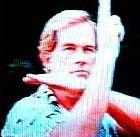
All through a long career led on every front, he worked with some of the greatest names of the silver screen in general (Vincent Price, Charles Bronson, Errol Flynn, Klaus Kinski, Christopher Lee, Isabella Rossellini...) and of the B-Movie in particular (Vampira, Umberto Lenzi, Alberto De Martino, Gordon Mitchell, Antonio Margheriti, Enzo G. Castellari, Joe D'Amato, Bruno Mattei, Jesus Franco, Teddy Page, Fred Olen Ray, Godfrey Ho...).
If the image of the great Richard Harrison is so deeply rooted in B-Movies, it is because the actor is indisputably a mainstay of the genre. As he kindly accepted to answer our volley of questions, the master goes back over his career in the following, pretty instructive interview exclusive to Nanarland. All with sharp lucidity, exemplary outspokenness and a definite contempt for cant !
Originally, you belong to this generation of actors who made a name for themselves in the cinema thanks to the sword and sandal films, following the example of Steve Reeves like Gordon Mitchell, Gordon Scott, Ed Fury, Mark Forrest or Reg Park with whom you were forming a kind of "community of American actors" in the Cinecitta studios. Was the nature of the relations between you and these actors at the time more of the kind of a conniving, friendly solidarity or of a harsh, fierce rivalry ? Would you explain why the career of Gordon Mitchell and yours are the only ones which survived the decline of the genre ?
Before going to Europe I was under contract to two different studios, in fact, I still had a picture contract with American Int. when I accepted a contract with Italo Zingerelli in Italy. I had made my living as an actor for six years, and I was not a body builder, but someone who worked out to keep fit. The people you mentioned were chosen because of their physiques. Most of them had not been trained to be actors. I was able to play in many different genre of films that had nothing to do with muscles. Except for Gordon Mitchell almost all of my friends were European. I prefer the European culture, and even now most of my friends are from Europe.
Gordon had a great face, and a very sweet personality.
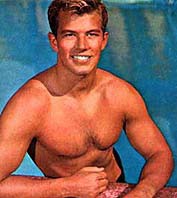
I was able to play in many different genre of films that had nothing to do with muscles.
How did you go from the body-building world to the movie industry ? If we ask you this question, it's because it seems to us that your father-in-law was running the AIP company and that it's how you have been hired, thus being on the verge of becoming an AIP " stock actor ". So, how have you eventually been casted for The Invicible Gladiator (Il Gladiatore Invincibile, 1963) ? Did the Italian movie industry appear to offer more parts and a better career opportunity for you than the Hollywood of these days ?
I was never considered a muscle man in Hollywood. I had a picture deal with AIP, but I chose to go to Europe instead when I was offered the contract. I had a great desire to go to Europe, especially Italy. I knew I didn't have the tools to be a great actor, nor the desire, but I felt I had what was needed to have a career. Certainly there were more films being made in Italy than Hollywood at that time.
I knew I didn't have the tools to be a great actor, nor the desire, but I felt I had what was needed to have a career.
What was the atmosphere like in the Cinecitta studios ? One can often hear that several films were sometimes directed at the same time, that the movies were made in a great number just like in a factory. Did it happen to you to act in several movies at the same time ?
When you are the lead actor you are required to be on the set, or available at all times. Gordon, on the other hand often would play a short part, then go on to another film. On the set I usually stayed to myself. My favourite pass time is reading, so that is what I would do when I was not needed in front of the camera.When you are the lead actor you are required to be on the set, or available at all times. Gordon, on the other hand often would play a short part, then go on to another film. On the set I usually stayed to myself. My favourite pass time is reading, so that is what I would do when I was not needed in front of the camera.

We have recalled Gordon Mitchell, recently deceased, who was also a body-builder before becoming a great sword and sandal movie star and whom you found yourself in several occasions by the side of afterwards. What was your relationship with him ? Did you see each other apart from the shoots ? In an interview he had very kindly granted us last Christmas, the late lamented actor - who had always loads of projects, whether artistic or not - was constantly repeating that the essential of his philosophy was summed up in the leitmotiv " keep yourself busy ". You who had voiced the wish to put an end to your acting career before running for the office of mayor of Palm Springs, California, in 1995 and again in 1999, do you recognize yourself in this way of life ?
Gordon was a special person. My sons grew up loving him, especially my youngest, Sebastian. When I started producing, directing and writing I would always try to use Gordon. Gordon was pure of heart.
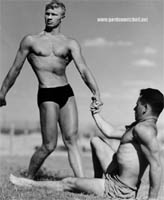
Gordon was pure of heart.
Concerning the 1972 western Due Fratelli (Jesse and Lester, Two Brothers in a Place Called Trinity), you are ascribed the co-direction with Renzo Genta. Was it some kind of an old wish or just an opportunity ? All the more so since you won't do it again till the 1986 Italian release Three Men On Fire, a project who appears more personal as far as this time you are also involved in the writing. Could you tell us more about this experience and explain why you didn't go further into movie direction ? Was it easy to persuade other icons of popular cinema like Gordon Mitchell, Alphonse Beni or Romano Kristoff - along with your son Sebastian - to be part of the venture ?
Actually, I did most of the writing on Jesse and Lester. It did not work out with Mr Genta, so after three days I took over the directing. I like to direct and have often done so, but did not use my name especially when acting as I felt it cheapened the film. I also enjoy writing, and several films I wrote have been made. I do not like to produce. I like writing and directing both better than acting, and believe I have more talent in that direction. Right now I am just finishing a script where the lead in a Russian [?]. I am not involved in the production end.
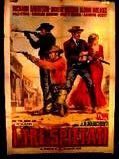
I like writing and directing both better than acting, and believe I have more talent in that direction.
Though you don't appear in the film, you are also ascribed the scenario of Bruno Mattei's Scalps, the latter being a director with quite an odd filmography. Could you briefly explain how you found yourself involved in this film enterprise ?
I wrote the script for my own film company, but I decided it was not the right time to make it ; then another company bought it from me. I have not seen the film, but I understand very little I wrote was used...

After the decline of the genre which made your name, you have stayed in Europe and continued your career with western pictures, some of which have since become imperishable classics like Ricardo Blasco's Gunfight at Red Sands (Duello nel Texas, 1963) or Antonio Margheriti's Vengeance (Joko Invoca Dio... e Muori, 1968). Here in Nanarland, some of us consider that these parts probably suit better your own personality than the sword and sandal movies. Is it the period of your filmography that you like the most ? In the mini biography one can find about you on the website www.imbd.com, it is said that you are the one who would have recommended Clint Eastwood to Sergio Leone for Fistful of Dollars (Per un Pugno di Dollari, 1964)... is it true ?
I had just finished working for the producers Pappi and Colombo, in a western, when they offered me another one. I really did not want to do a western again as they seemed so different than the ones made in America. I kept telling them no, but Sergio Leone insisted I do the lead. The producers told me it was not a good film and since I had other offers I decided against it... Leone actually followed me and came on the set where I was working and watched me from afar. Finally, the producers asked to see me again, and after I affirmed I would not do the film they read me three names of actors from Hollywood that had been sent to them. Since they did not know who they were they asked me to recommend one of them. I knew of all three. My choice was Clint, only because he knew how to ride a horse. So many American actors were not able to ride well. That is the real story.

My choice was Clint, only because he knew how to ride a horse.
During the 70's, you have acted in some extremely hard and violent " cop " movies, such as Sergio Grieco's The Mad Dog Killer a.k.a. The Beast With a Gun (La Belva Col Mitra, 1977) with Helmut Berger and Marisa Mell. What kind of look do you take at these pictures which were most of the time harshly criticized for their crude violence ? Do you know that Tarantino was such a fan of this movie that he slipped an excerpt on a television watched by Bridget Fonda in Jacky Brown ?
It wasn't very often that I liked the scripts that were offered me, but Sergio Grieco was a very nice person and I looked forward to doing the film. Helmut and I got along very well until Marisa arrived, then she got him back on drugs. I have little patience for people who take drugs, and worse, Helmut went completely out of control. He hit another actor during a scene and put him in the hospital, then the next day we had a big fight at the end of the film where he had a knife. He arrived one hour late completely drugged. The knife was real, so it was very important not to make a mistake. Twice he almost stuck it in my face. I was so mad I told him the next time I would hit him so hard he wouldn't have a face left. He started screaming like a baby. We ended up using stunt doubles. Later, Helmut apologized to me, saying he couldn't act unless he took drugs. I felt sorry for him. A German actor told me recently that Helmut stopped taking drugs and was married. I hope that is true. Someone sent me recently a piece written by a critic criticising me for not being more forceful, but since Helmut played his part like a lunatic I decided to play it more calmly. Anyone who has acted would know it is much easier to rant and rave than to play something calmly. I am very much against unnecessary violence and four letter words in films, unless it really pertains to the story.It wasn't very often that I liked the scripts that were offered me, but Sergio Grieco was a very nice person and I looked forward to doing the film. Helmut and I got along very well until Marisa arrived, then she got him back on drugs. I have little patience for people who take drugs, and worse, Helmut went completely out of control. He hit another actor during a scene and put him in the hospital, then the next day we had a big fight at the end of the film where he had a knife. He arrived one hour late completely drugged. The knife was real, so it was very important not to make a mistake. Twice he almost stuck it in my face. I was so mad I told him the next time I would hit him so hard he wouldn't have a face left. He started screaming like a baby. We ended up using stunt doubles. Later, Helmut apologized to me, saying he couldn't act unless he took drugs. I felt sorry for him. A German actor told me recently that Helmut stopped taking drugs and was married. I hope that is true. Someone sent me recently a piece written by a critic criticising me for not being more forceful, but since Helmut played his part like a lunatic I decided to play it more calmly. Anyone who has acted would know it is much easier to rant and rave than to play something calmly. I am very much against unnecessary violence and four letter words in films, unless it really pertains to the story.
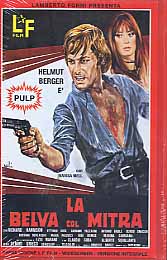
Helmut and I got along very well until Marisa arrived, then she got him back on drugs.
Some consider Secret Agent Fireball (Le Spie Uccidono a Beirut, 1965) as your best film ever. Would you agree with that ? Was the part of "Agent Bob Fleming 077" important in making you a cult actor ?
I enjoyed doing this time of modern film. Most of the films made during this time in Italy were made so cheap that it really hurt the film. Even though this and some of the other films I did were not big budget, the producer was smart enough to put some money where it was needed. I never played the Actor thing. And I never thought about being a cult actor, if that is what I am. I will admit that sometimes I would start a film and find it so bad that I just walked through the part
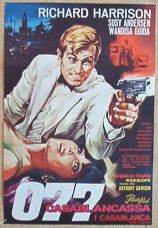
I will admit that sometimes I would start a film and find it so bad that I just walked through the part
Did starring in films like Avenger of the Seven Seas (Il Giustiziere dei Mari, 1961) or Three Sergeants of Bengal (I Tre Sergenti del Bengala, 1965) gave you the feeling to actually compete with Hollywood greats, living or dead, like Errol Flynn or Gary Cooper ? Do you think fantasy and imagination were sufficient assets, for Italian films, to make up for the lack of means ? What is your opinion about the evolution of B-movies in nowadays film industry ?
I enjoyed the career I had as an actor most of the time, travelling and meeting interesting people, and the opportunity to always have nice homes. I never thought of myself in the category of the actors you mentioned, and when many of the countries put me into this group I was very embarrassed. I never wanted to be anyone else ; I have always wanted to improve myself as a person. It actually irritated me when people would try to make a fuss over me.
I never wanted to be anyone else
Strangely, you are relatively unseen in the horror and fantasy releases of the time : was it a deliberate choice ?
I wanted to be in French and Italian films etc. that told about real life. It never happened
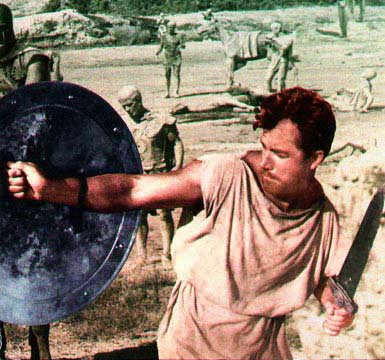
Your Italian movies were sold throughout the whole world. Were you never tempted to go back to the States like Clint Eastwood and restart your career there ? Or would your work as an "Italian B-movie" star have been a handicap rather than an asset ?
In my opinion, it is a death wish for an actor to be in too many B or should I say C movies. I honestly believe I am a good writer, and under the right circumstance a good director. Maybe my greatest contribution to cinema was not doing Fistful of Dollars, and recommending Clint for the part.
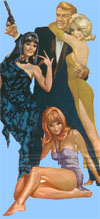
Maybe my greatest contribution to cinema was not doing Fistful of Dollars, and recommending Clint for the part
You starred in a soft porn / erotic fantasy movie directed by Joe D'Amato called Black Orgasm a.k.a. Voodoo Baby (Orgasmo Nero, 1979) which reportedly had a "hard porn" version with hardcore inserts. How were you involved in that film and what did you think of this experience ? How was the work with Aristide Massacessi a.k.a. Joe D'Amato?
I had never been to Santo Domingo, and the script I read was not at all porno. I don't know how he did those sexy scenes with me, but he was known for this type of talent. I did not enjoy the shooting of this film. There was something about this whole film set up I did not like. They were very good about keeping me in the dark, as was Mr. Lai.
I don't know how he did those sexy scenes with me, but he was known for this type of talent.
In the 80's, Italian cinema is on the wane, quantitatively and qualitatively, facing the concurrency of B-Movies from the USA or from Asia. What do you think was the main cause for the inexorable decline of the Italian movie industry and its popular cinema ? Was it because you were no longer offered interesting parts in Europe that you took yourself off to Asia, notably to the Philippines and then to Hong Kong ?
There was very little work for anyone in Italy. The Italians had jacked up the costs so much that it was no longer an advantage for foreign companies to shoot there. I had tremendous overhead, which was mostly my fault. At one time I was taking care of five homes, a Rolls Royce, Ferrari, Mercedes and a whole slew of hanger-ons. It was not a slow transition. It was work, no work. It took a while to understand it was over. Except for the Shaw Bros. it was not an over-all good experience.

If Marco Polo (Ma Ko Po Lo, 1975) and La Révolte des Boxers (Pa KuoLien Chun, 1976) can both be considered as good films from the Shaw Brothers Studio, on the other hand, one can't say the same of the Hong Kong ninja flicks you acted in for Godfrey Ho, Joseph Lai and the IFD company. Though we are yet more or less aware of the disappointments and difficulties you experienced there due to Godfrey Ho's dubious practices, we really would like you to take the time to explain it all and well here. Having watched several of the movies incriminated, it seems indeed that your appearance is sometimes due to an improper edition. In some of these pictures you have a moustache, in other you don't ; usually you have ninja parts but not only (as one can see in Cobra vs Ninja with Mike Abott, 1987). As it seems that you feel very strongly about expressing yourself about it, please, enlighten us !*
It is almost painful to discuss this with you. Mr. Ho was a young boy who picked me up at the airport to work with the Shaw Bros [for the shooting of Marco Polo, on which Godfrey Ho was a crew member at the time - Nanarland's note]. I remembered him because he was so enthusiastic about one day becoming a director. I can't remember exactly how I was later contacted for these Hong Kong films, but I was delighted when I learned that Godfrey Ho was the director. Twice I went to Hong Kong to work for them, and even though the quality of the films were very poor my wife and I enjoyed Hong Kong very much, and the crew was mostly made of nice people. Then Mr. Tomas Tang contacted me to make a film for him. I told Godfrey about the offer in strict confidence, but he told Mr. Lair, who told me I could not do the film. Naturally, I told him that after I finished my contract with him I was free to work with whomever I wished. Mr. Lai contacted a friend who was a tax man and was told I owed quite a bit of money in taxes. When I showed that my contract stated I would not be responsible for any taxes in Hong Kong, the man said it was not valid. I agreed then to do another film for Mr. Lai to pay the taxes. There was no script, only sides. Nothing made any sense, but the stories usually didn't. Then a young English boy warned me to be careful because they were pulling some type of dirty trick on me. To be quite honest with you I was not too worried as all the work I had done for them was so bad I was sure no one would ever see them outside the cutting room. Also, during this last film or films, our living conditions were not good. My first call came from Germany telling me how bad the films were and they had only bought them because they trusted me. I have no idea how many films they made from my last filming, but some say as many as ten. I put a lot of trust in friendship, so it hurt more than just professionally.
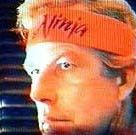
I have no idea how many films they made from my last filming, but some say as many as ten.
Who actually directed the films, Godfrey Ho or Joseph Lai ?
Godfrey Ho was always the director.
You say you quit acting because of these movies : to what extent did they actually damage your career ? Were there other reasons which brought you to quit acting?
This experience made me feel very dirty. I really felt like a prostitute. They were thrown in my face all the time. I saw part of one once, it had something to do with witches. I don't think I had more than a couple of scenes in it.

This experience made me feel very dirty. I really felt like a prostitute.
These films are very hard to understand as, in an obvious way, they have been edited any which way with some old Asian pictures. The scenes you were acting in have been scattered in more than 10 other films out on video, each of this film having your name in large characters on the cover though you were supposed to act only in one originally. It is of course a very dishonest process, and we imagine that you probably didn't appreciate the fact of having your name improperly used to sell products of such a poor quality ! Didn't you try to prevent these films from being sold ?
I didn't feel I had any chance whatsoever of stopping these films from distribution. It was my trust that caused this, and that does not stand up with the law. I felt helpless in Hong Kong. This was the reason I stopped caring about acting. I really felt dirty and used. Again, I will say I had no one to blame but myself for being so trusting.
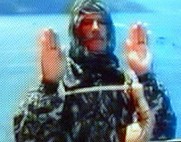
The website www.ultimateninja.com, to which you have granted a brief interview, shows a long one of Godfrey Ho [which is here forwarded, please see the 2nd word document]. Your name being mentioned 2 or 3 times, and Mr Ho not always seeming 100% sincere (he notably told them, among other things, that he had "never edited footage together" in his movies...), we would like to have your opinion on the comments which are remotely connected with you. As we are also actually considering the possibility of getting an interview from Albert Garai, cameraman for all the Godfrey Ho movies you were in a way or another involved in, is there any question in particular you would like us to ask him ?
I read the interview with Ho, and found it ridiculous. He spent his whole time in the editing room. He had very little skill as a director and I always considered him a little boy. I sincerely do not remember the name of the camera man, but I liked him very much, more than anyone else. Let me relate one incident that really bothered me. In the script there is a scene where my wife goes to the refrigerator and finds our pet dog dead inside. An easy scene to shoot without causing any hard to the animal. I have done scenes similar many times. Several days before they had brought a puppy to the set, and I had spent my free time playing with it. The camera man came over to me and said there was a bed upstairs I could take a nap on, so I went and laid down. I heard the little dog scream and I ran down stairs. One of the crew had broken the dogs neck and they were laughing about it. I am a lover of animals, and have never killed any animal in my life. I knew I was not in my country and it would not be wise to make a case out of this. I did say that in Europe or the USA they would have gone to jail. On a lighter side he taught me to use a tongue scraper, which I still do.

I read the interview with Ho, and found it ridiculous.
You have also acted in some vigilante and war movies in the Philippines which are quite violent, like Eliminator (Hunter's Crossing, 1983) or Ultime Mission a.k.a. Opération Cambodge (Intrusion Cambodia, 1987) and in which are usually found the same Caucasian actors, such as Ron Kristoff, Mike Monty, Max Thayer, Mike Cohen or Jim Gaines. Do you appreciate these pictures ? Did you keep in touch with the director Teddy Page and the other actors... ?
These films were not very good, but I truly like Ron Kristoff, and will never understand why he didn't get out of the Philippines. Mike Monty spent time in Italy and stayed with Gordon Mitchell. Felt sorry for Teddy Page, He was not treated with dignity by the producer.
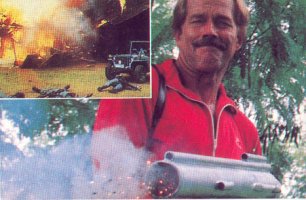
Felt sorry for Teddy Page, He was not treated with dignity by the producer.
Amok (idem, 1982) appears as some sort of a break in your career. The film in question is an African spectacular in which you play the part of an anti-racist reporter, an individual whose humane personality seems much more elaborated than the other characters of your filmography. Two decades later, Amok remains unique in the history of cinema, as far as Africa very seldom produces such large-scale, ambitious movies. What memories did you keep of this experience ?
The producer-director was a real gentleman. He worked with passion. It was a very nice experience
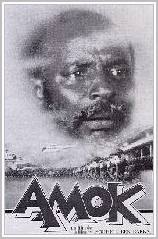
Here in France - where it seems that you began to be known thanks to Persée l'Invincible (Perseo l'Invincibile, 1963) - you have also acted in co-productions like La Guerre du Pétrole (in which your character dies under the Eiffel Tower !) or Marc Simenon's L'Explosion. What memories do you keep of France ? At the time you were involved with Eurociné in what was reportedly a reworking of one of your Italian movies, La Guerre du Pétrole (Strategia Per una Missione di Morte, 1978) which became Lorna, Lionne du Désert with additional scenes. Were you coproducer with Eurociné ? According to you, why did a proper B-movie industry never really developed in France the way it did in Italy ?
La Guerre du Pétrole was not a good picture. Marc Simenon is a lovely person, as is his wife. I am sorry the film was not better... I was not involved as a producer with La Guerre du Pétrole. I am in love with France. I consider the French the most educated people in the world. I have only wonderful memories of the country and the people.
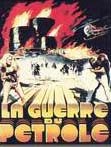
I am in love with France. I consider the French the most educated people in the world.
In 1988, you have acted in the surprising Alerte à Las Vegas from French director Norbert Moutier, alias N. G. Mount, known throughout Paris as a bookseller, a publisher of very rich works on the cinéma de genre (including one about you actually) and a keen movie buff directing his own very low budget films. How did you get into such a venture ?
That's a good question. I met him and he said he wanted to make a film and asked me to be in it. I agreed, never for a moment thinking he actually would, but once I gave my word I could not go back on the promise. He was a very nice person, but knew very little about the business.
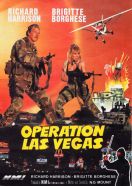
He was a very nice person...
... but knew very little about the business.
The freshest news we have about you is that you plan to direct a movie called Jerks. Could you tell us more about this personal project and how advanced it is ? Do you have any other plans for the future ?
No, I got trapped into the film Jerks by my wife. She promised the director he could use our home in Palm Springs and that I would be in the film without asking me. I couldn't believe she did this. I was not paid for my acting or my house. We did it as a favour. I am working on a project and if it is made it will be my chance to prove myself. However, with the type of films made today I would not be surprised if it does not get made.
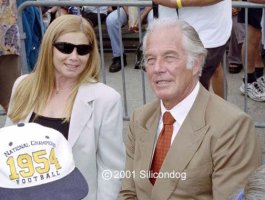
I am working on a project and if it is made it will be my chance to prove myself
Well... here is the end - at last ! - So, to conclude, here again and one more time, in the name of all the members of our team, and for all the people we are sure will be glad to find this interview on our website, I would like to thank you, in all sincerity though a bit solemnly, for having been so open and so friendly Mr Harrison.Best wishes to you and those you love !
I have tried to give you honest answers.
My very best,

